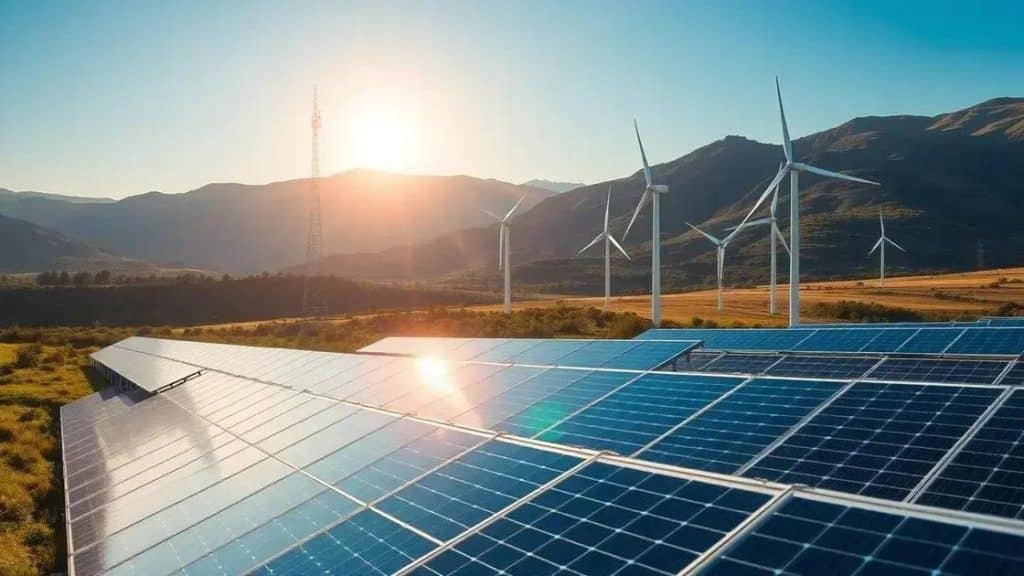New tax incentives for clean energy investments await you

New tax incentives for clean energy investments significantly reduce costs, promote sustainability, and help individuals and businesses lower their environmental impact while boosting economic growth.
New tax incentives for clean energy investments are generating buzz in various sectors, and it’s worth understanding how they might benefit you. Have you considered how these incentives could lower your costs while supporting sustainable practices? Let’s delve into the details.
Understanding the new tax incentives
Understanding the new tax incentives can help individuals and businesses take advantage of significant savings while encouraging clean energy initiatives. These incentives can vary based on your location and the type of investment you are considering.
Types of New Tax Incentives
Tax incentives can come in various forms. They often aim to promote investments in renewable energy solutions. Here are some common types:
- Tax credits that directly reduce the amount owed to the government.
- Deductions that lower taxable income, resulting in lower taxes.
- Grants and rebates that provide upfront cash for installation costs.
Each of these incentives can significantly impact the overall cost of adopting clean energy technologies.
Eligibility Requirements
To qualify for these new tax incentives, you typically need to meet certain criteria. These may include:
- Using approved clean energy technologies, such as solar panels or energy-efficient appliances.
- Meeting installation standards set by local or national authorities.
- Filing the appropriate forms and documentation when filing taxes.
Being aware of the requirements is essential to maximize your benefits.
Many businesses also find that adopting these technologies not only yields tax savings but also enhances their reputation for sustainability. This perception can attract more customers who prioritize environmentally friendly practices.
Investing in clean energy can be a win-win situation. Not only do you save money on taxes, but you also contribute to a healthier environment. It’s a tangible way to demonstrate a commitment to sustainability.
Impact on Future Investments
By understanding and utilizing these new tax incentives, you can set a precedent that encourages further investments in clean energy. The long-term benefits far outweigh the initial costs. As these incentives evolve, staying informed will help you make the most impactful decisions.
Key benefits of clean energy investments

Investing in clean energy presents a multitude of benefits that can greatly impact individuals and businesses alike. Understanding these key benefits is essential for making informed decisions.
Cost Savings
One of the most noticeable advantages of clean energy investments is cost savings. By utilizing renewable energy sources, you can significantly reduce your utility bills over time. This is especially true for options like solar panels, which allow homeowners to generate their own electricity and minimize their reliance on traditional power grids.
- Lower monthly energy costs
- Reduced maintenance costs compared to conventional systems
- Potential for government tax incentives and rebates
Additionally, companies that invest in clean energy technologies often report lower operating costs.
Environmental Impact
Transitioning to clean energy sources plays a crucial role in combating climate change. These investments help reduce carbon emissions and pollution, contributing to a healthier planet. Every action counts when it comes to protecting the environment.
Solar, wind, and other renewable resources significantly decrease your carbon footprint. The more we invest in these technologies, the greater the benefit to our planet.
Moreover, by investing in clean energy, you are taking part in a larger movement towards sustainability that can inspire others to follow suit. This positive ripple effect extends to future generations.
Energy Independence
Another vital benefit is energy independence. By relying on renewable energy sources, individuals and businesses can lessen their dependence on imported fossil fuels. This not only contributes to national energy security but also stabilizes energy prices.
As the world shifts away from traditional energy sources, communities can actively participate in shaping their own energy futures. Embracing clean energy investments often leads to job creation in the renewable energy sector, stimulating economic growth.
Ultimately, adopting clean energy solutions offers a path towards a sustainable future. It allows you to save money, protect the environment, and promote energy independence, making it a decision with lasting impacts.
How to qualify for tax incentives
Qualifying for tax incentives can seem complex, but understanding the criteria can simplify the process. Many individuals and businesses miss opportunities due to a lack of information.
Eligibility Criteria
The first step is to understand the eligibility criteria for the new tax incentives. Each program may have its own rules, but common criteria include:
- Type of investment in clean energy technologies, such as solar energy or energy-efficient appliances.
- Compliance with local and national standards for installation and usage.
- Completion of required forms and documentation when filing taxes.
By following these guidelines, you can ensure that you’re on the right track.
Documentation Needed
To qualify for these incentives, collecting the necessary documentation is crucial. This often includes proof of purchase and installation, such as:
- Receipts for equipment and installation services.
- Certification showing the equipment meets eligibility standards.
- Energy audits, if required, demonstrating energy savings.
Having all your paperwork ready can speed up the process and reduce potential issues.
Understanding the specific benefits of each tax incentive program can also guide your decision-making. For instance, some states offer additional benefits beyond federal incentives, impacting the overall savings you can achieve.
Moreover, consulting with a tax professional can provide clarity. They can help navigate the regulations and ensure that you take full advantage of the incentives available.
By being prepared and informed, individuals and businesses can maximize their benefits from these new tax incentives, contributing positively to both their finances and the environment.
Future outlook on clean energy policies

The future outlook on clean energy policies is bright and promising. As governments worldwide commit to sustainability, the landscape for renewable energy investments is changing rapidly.
Government Initiatives
Many countries are setting ambitious goals to reduce carbon emissions. These initiatives often include incentives for the development of clean energy technologies. Policies might focus on:
- Increasing funding for research and development in renewable energy.
- Implementing stricter regulations on carbon emissions.
- Encouraging public-private partnerships to drive innovation.
These actions are essential for fostering a supportive environment for clean energy investments.
Technological Advances
As technology evolves, the efficiency of renewable energy sources continues to improve. Innovations like advanced solar panels and wind turbines are making it easier to harness nature’s power. The benefits of these technologies include:
- Lower costs for production and installation.
- Enhanced energy storage options, improving reliability.
- Greater integration with existing energy systems.
These advancements will play a vital role in shaping the future of energy policies.
The emphasis on transitioning to clean energy is not just an environmental imperative but also an economic opportunity. Investing in clean energy policies can create millions of jobs and stimulate economic growth. As communities become more aware of environmental issues, demand for clean energy solutions will likely continue to rise.
Looking ahead, the commitment to sustainability and climate change mitigation will drive policy changes and funding opportunities. This shift will encourage more individuals and businesses to invest in clean energy solutions, reinforcing the importance of these initiatives for future generations.
FAQ – Frequently Asked Questions about Clean Energy Investments
What are the main benefits of clean energy investments?
The main benefits include cost savings, environmental impact reduction, and energy independence, along with potential job creation.
How can I qualify for tax incentives related to clean energy?
To qualify, you need to meet eligibility criteria, such as using approved technologies, and provide necessary documentation.
What are the future trends in clean energy policies?
Future trends include increased government initiatives, technological advances, and a greater emphasis on sustainability to combat climate change.
Are there specific tax incentives available for renewable energy investments?
Yes, many countries offer tax credits, deductions, and grants for individuals or businesses that invest in renewable energy.





